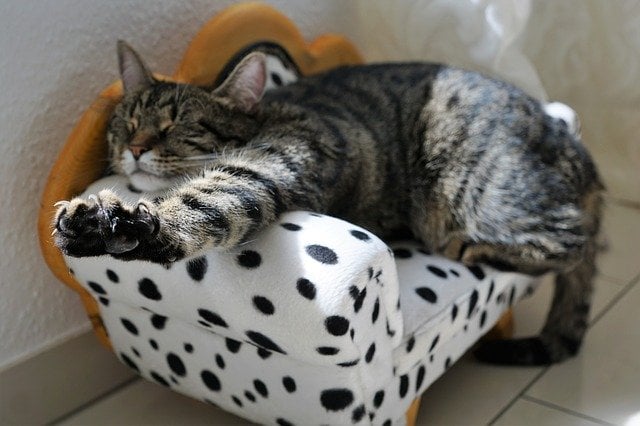Could you imagine having the option of licking yourself clean whenever you got dirty? Champagne splashed in your face? No problem. Chocolate ice cream melting down your arms? No problem. Such is the life of a cat. Their ability, and innate sensibility, to self-groom isn’t just about staying clean, though–it’s about survival.
Grooming rids cats of parasites, keeps them cool, and allows them to maintain their luxurious coats. But what to do if your cat is a little too groomed? Overgrooming is a somewhat common issue for kitties that can easily go unnoticed simply because cats groom so much. Here’s how to identify, and help, overgroomers.

What are the signs of overgrooming?
Cats can spend up to 50 percent of their day grooming so identifying overgroomers can be a little bit difficult. Pamela Perry, DVM, of the Animal Behavior Clinic at Cornell University College of Veterinary Medicine explains via the Cornell Feline Health Center, “It’s a huge chunk of their day. Because cats groom frequently, owners usually don’t notice a problem until they observe significant hair loss or skin lesions.”
If a cat is obsessively licking or seems to be concentrating on one spot in particular, these can be signs of overgrooming. Specific indicators include:
- Bald spots caused by licking
- Sores on the skin
- An unusually large amount of hairballs
Why does overgrooming happen?
Overgrooming is usually a symptom of something else, and most vets will advise kitty owners to look for a physical cause before exploring the possibility of behavioral issues.
“Cats will lick when an area of their body is itchy or painful,” says William Miller, Jr., VMD, a board certified specialist in dermatology and a professor at Cornell University’s College of Veterinary Medicine. “If pain is the issue, the licking is focused on the painful area, like in cases of disc disease or anal sac impaction. With itchy diseases, however, the licking is more widespread,” he adds.

What are the most common causes of overgrooming?
Overgrooming happens for a wide variety of reasons and can even be influenced by a cat’s breed (Oriental breeds such as Siamese and Himalayan cats are more prone to overgrooming) or, in rarer cases, neurological issues. As Natalie Stillwell, DVM, MS, PhD, explains to PetMD, overgrooming is most frequently caused by irritated skin, pain, boredom, or stress.
Irritated skin: “Irritated skin can result from an infection or from a cat’s allergy to certain foods, parasites or substances in the environment,” points out Stillwell. Cats can focus licking on the area in an attempt to relieve the discomfort but those little barbs on their tongue can just make it worse and can even lead to a painful infection.
Pain: Overgrooming can be an indicator that your cat is experiencing pain beyond what is visible to you. Stillwell mentions as examples, “disc disease can cause back pain so that your cat over-grooms a certain spot on their back, while a urinary tract infection or anal sac impaction may encourage excessive grooming of the genitals or perianal area.”
Boredom or stress: We all have different ways of managing these and, for cats, this can mean obsessive grooming–also called psychogenic alopecia. “It is thought that licking releases endorphins that help relieve anxiety, so when a stressed cat finds relief in licking, it can turn into a habit,” says Stillwell. If you have had changes to your household–such as a move, a new family member, a new pet, or perhaps a new job that has you away from home more–these can trigger overgrooming.

What to do if your cat is overgrooming
It is important to first rule out physical issues that might be causing overgrooming. Your Vet can check kitty for common culprits such as parasites or allergies and if these aren’t the cause, look deeper to see if your kitty may be suffering from an unseen ailment. Your Vet can then assist with medicines, skin treatments, or allergy recommendations to get kitty focused on other things.
If your Vet determines there are no underlying physical causes for overgrooming, then look to what’s going on the home. If you have had recent changes to your household or your cat isn’t getting enough enrichment, take steps to be sure she’s getting plenty of love from you. Also, be sure you are providing plenty of intelligent toys, outside views, and cozy hideaways to keep her brilliant mind at ease. Another great idea is to invest in some quality grooming brushes to lend your kitty a hand. Not only is it a great way to bond, but it also gives you a chance to regularly check her coat and body for anything that might cause a recurrence.



